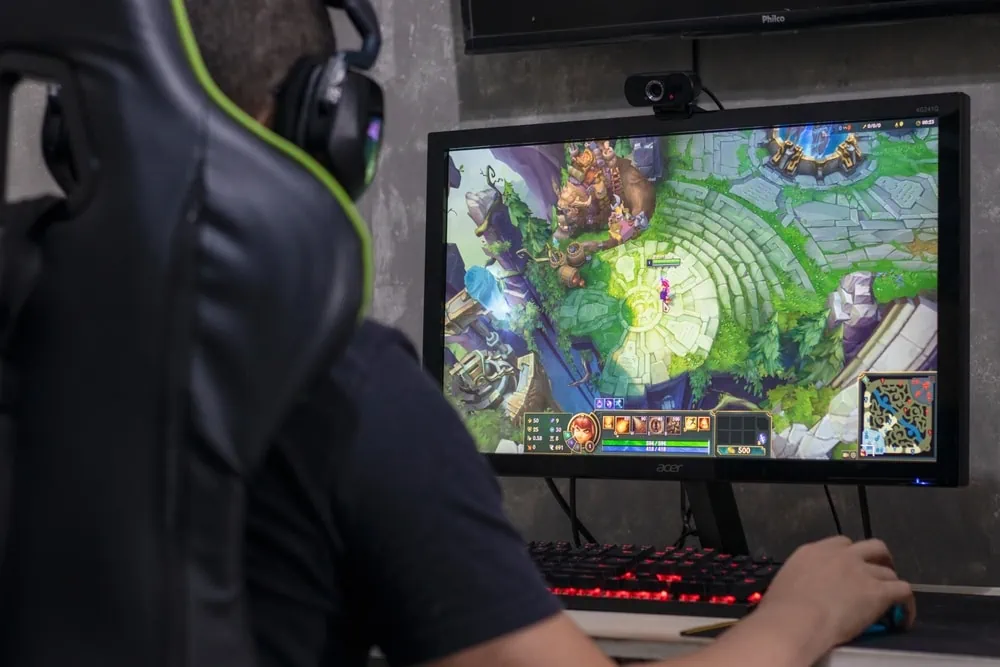With a value of over £17 billion and companies like Tencent and NetEase leading the way, China’s e-sports market is ripe with opportunities for British businesses – from technology companies to consumer brands and beyond. Jack Forsdike finds out more
It is no secret that China’s games industry is colossal, but there’s also a specific market within the games industry that is becoming too big to be ignored: e-sports. E-sports is the competitive element of video gaming, with amateur and professional competitions played in various games and genres. Since e-sports requires a player vs player (PVP) element, certain genres of game, mainly those with competitive multiplayer elements, are far more suited to having thriving e-sports scenes.
Some of the most popular e-sports games in China include the famous PC multiplayer online battle arena (MOBA) League of Legends (LoL), mobile-based Honour of Kings, and the mobile battle royale Game for Peace, which is the official Chinese version of PlayerUnknown’s Battlegrounds (PUBG). Tencent now operates all three of these games (Riot Games, which developed and published LoL in 2009, has been fully owned by Tencent since 2015), so they have a clear incentive to invest in the growth of the e-sports industry in China.
To give a little context on these game genres, MOBA games tend to pit two teams of five players against each other in matches that last an average of around 30 minutes. Battle royales, on the other hand, include up to 100 players in direct combat, and teams of four fight to eliminate one another until only one team remains. If you’ve heard of Fortnite, then you’ve heard of a battle royale game, with Apex Legends and Call of Duty: Warzone being other popular options.
For an idea of how popular Honour of Kings is in China, data taken from China’s five largest live streaming websites showed that in 2021, a monthly average of 781,000 people streamed Honour of Kings gameplay, while an average of 1.8 million daily comments were made on the game’s broadcasts.
The development of e-sports in China
It is clear that the Chinese e-sports market is making waves, accounting for over a third of the global market. E-sports was first recognised by the Chinese government as an official competitive sport in 2003. However, this policy marked the start of a long and bumpy road for e-sports in the 2000s, with multiple policy u-turns and a lack of serious investment. That all changed in 2011 when Wang Sicong, son of the billionaire chairman of Wanda Group, took an interest. His investment in e-sports shifted perceptions of the industry in China, and soon investors were flooding in after him, sensing there was money to be made. It was in this period that many of the prominent e-sports teams in China were founded, including Edward Gaming (EDG) – winners of the League of Legends World Championships in 2021 – back in 2013.
Naturally, since e-sports needs video games to exist, the huge growth in the Chinese gaming industry during this period was also vital in fuelling the fires of e-sports and increasing its popularity. More major breakthroughs came in the late 2010s, largely in the form of further government support to match the substantial financial growth the sector was seeing, with e-sports becoming a university major available for study at over 50 Chinese universities in 2017, and e-sports operators and players both being listed as official professions in China in 2019.

A gamer playing League of Legends
Sizing up China’s e-sports market
Today, the most recent figures value China’s e-sports industry at over £17 billion in 2022. This figure represents a 14% drop from last year, but this doesn’t worry those familiar with the industry. Elaine, a professional e-sports broadcast host and a lecturer at Communication University of China Nanjing’s School of E-sports, puts this down to the pandemic-fuelled artificial, unsustainable growth that esports saw in 2020 and 2021. “People spent extra time at home, and gaming is incredibly accessible, especially mobile games, so more time and money invested on esports-related activities was completely normal. The decline last year also coincided with when the financial cost of two years living with the pandemic really began to hurt people, so consumption was down everywhere, regardless of sector,” she explains.
Despite this momentary dip, it’s clear to those in the industry that the growth in consumption in games, and therefore e-sports too, is only going to go one way: up. Many people point to the 2022 Asian Games, now scheduled to take place in Hangzhou in September 2023, as evidence of how much progress e-sports has made in recent years. For the first time on record, e-sports will feature as a medal event at the Asian Games, and China hosting such a historic event will not go unnoticed. Combine this with the return of other offline e-sports competitions and events now Covid measures have been relaxed, and 2023 is set to be a great year for e-sports in China.
Opportunities for international collaboration
The success of e-sports has not gone unnoticed by international businesses, and there are already huge levels of engagement with Chinese e-sports from companies outside of China. One well-known example of a British institution that’s seen success in China is Wolves. Primarily known in the UK for being a Premier League football team – aka the Wolverhampton Wanderers – Wolves have become associated with a different game in China. The club’s affiliated e-sports teams compete in some of the biggest leagues in the country. And they’re not alone: Paris Saint-Germain (PSG) sponsored Chinese e-sports team LGD Gaming in a move that saw the Chinese team rebranding to PSG.LGD.
Fan acquisition is a key driver of these moves – a fantastic way for brands and IPs to introduce themselves to an entirely new user base. This seems to have paid off so far for Wolves. On Weibo, one of China’s most widely used social media channels, Wolves’ football club account boasts nearly 650,000 followers, only less than the Premier League Big Six teams, Everton, and Leicester. However, their Honor of Kings account has over 3.3 million followers, so the football club’s profile in China is sure to continue growing.
E-sports is a natural area to expand into for football clubs or other similar IPs, for whom building the brand and gaining fans to boost their profile and viewership figures without necessarily making direct purchases is a valuable operation.
Still, for commercial brands, jumping blindly into e-sports isn’t necessarily a quick route to success, and thinking smart rather than being wooed by the numbers is key to finding a successful partnership in the e-sports sector.
Many of the most popular UK brands in China fit into the ‘premium’ category, including Burberry, Rolls Royce and Ted Baker. Yet the majority of e-sports fans in China are Gen Z students, meaning that they’re simply not the customer base that many British brands are targeting. This is where knowledge of the market is vital, as Elaine points out: “brands that focus on cheap mass consumption have the most to gain from traditional partnerships with the largest e-sports events, with KFC being a good example. Students who see a KFC advert during a broadcast of their favourite team may suddenly be inspired to get a takeaway, but what will they do if they see adverts for a car? It’s not relevant to them and they aren’t as likely to remember it, so you have to pick your market carefully”.
However, this is not to say that there are no opportunities for more upmarket brands. A potentially niche but smart partnership from Ferrari saw them sponsor an e-sports event for the NetEase game Fantasy Westward Journey. Interestingly, the game hasn’t garnered much attention outside of China – or even domestically – since it’s a massive multiplayer online role playing game (MMORPG), which means there is more focus on the game’s world and story than the competitive PVP aspect.

Ferrari’s partnership with NetEase game Fantasy Westward Journey
So why did Ferrari partner with a game like this? The answer lies entirely in the user base. Fantasy Westward Journey has been live since 2001, and in the 22 years since, has gathered an incredibly loyal fan base, with the key being that this is an age group that started playing games as early as the 2000s. The average user age of this game is much older than more recent e-sports-orientated games, and vitally, they are much more affluent. The players competing in e-sports events for this game aren’t young professionals looking for a cash reward, but those with already established careers who are looking for a feeling of victory and success that money can’t buy. A light show above the Chengdu skyline orchestrated by hundreds of airborne drones and an illuminated message around Guangzhou’s famous Canton Tower are examples of recent methods used to congratulate the winners, and it is through these kinds of events that premium brands can reach their target market.
The outlook for British brands in China’s e-sports market
Sponsoring e-sports events, teams and players, or directly purchasing advertisements during e-sports broadcasts, aren’t the only opportunity available for British brands looking to gain from this huge market. It’s important to note that e-sports is a large industry with a highly complex ecosystem, so there are multiple avenues that British institutions can go down. For example, the growth of e-sports-related majors within universities in China could provide opportunities for British educational institutions with similar offerings. Whether it be attracting Chinese students to these e-sports-related courses in the UK or directly partnering with Chinese universities to offer joint courses, there are many areas where partnerships can be forged outside of the more traditional sponsorships and advertisements.
Another entirely different example comes from ILOVEDUST, a top-class British digital design studio that has worked on multiple projects providing design services to Chinese organisations in the e-sports industry. John McCulloch from the studio stated, “When you look at the scale of the esports industry now in China, it’s amazing to see. With viewing figures comparable with the Premier League and the NBA, it’s natural that such a big industry brings opportunities to us as designers”. There is little doubt that as this industry continues to grow so will the opportunities for British organizations.
The key takeaway is that, first and foremost, the e-sports industry is here to stay. Despite a slight blip in 2022, the predicted growth of the industry is massive, and those involved are all hopeful about the future. An industry of this size naturally creates opportunities for British organisations, but it is important to focus on quality over quantity. A targeted, focused partnership with clear goals is vital to achieving success in what is already a competitive market, so whilst organisations should definitely be considering where opportunities may lie, they should also manage expectations and make sure their research is as thorough as possible, as only then can they leverage this hugely complex market to their advantage.




